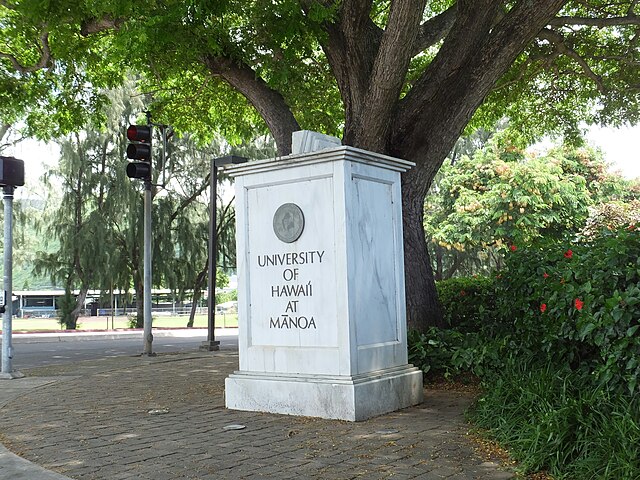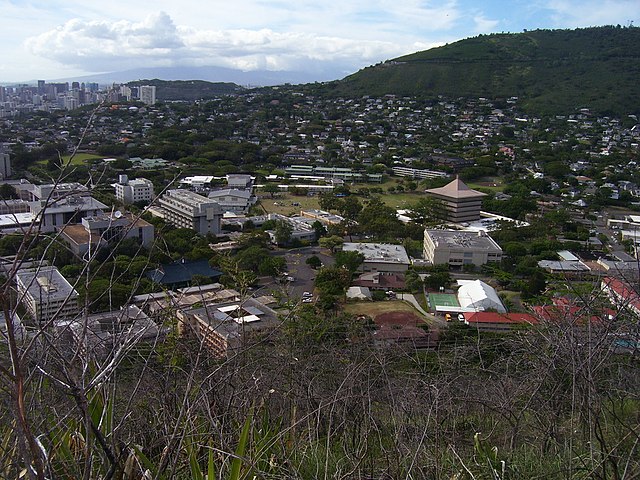
The Facebook page of the Faculty of Social Administration, Thammasat University has announced that TU students have until 1 December 2020 to apply for scholarships for master’s and doctoral degree students in the East-West Center Graduate Degree Fellowship (GDF), the University of Hawaii at Mānoa, the United States of America.
The University of Hawaiʻi at Mānoa is a public research university in Mānoa, a neighborhood in Honolulu, Hawaii.
Notable alumni of the University of Hawaiʻi at Mānoa include the parents of US President Barack Obama, Barack Obama Sr. and Stanley Ann Dunham.
The Thammasat University Library collection includes a number of research works published at the University of Hawaiʻi at Mānoa.
As its website explains,
The East-West Center Graduate Degree Fellowship provides master’s and doctoral funding for graduate students from Asia, the Pacific, and the United States to participate in educational, cultural, residential community building, and leadership development programs at the East-West Center while pursuing graduate study at the University of Hawai‘i at Mānoa (UHM). Undertaking degree studies at UHM through an East-West Center fellowship is not merely about receiving a financial aid scholarship. Since the basic purpose of the East-West Center is to build a sense of Asia-Pacific community and prepare for future leadership roles, EWC graduate student fellows live together and interact with each other in both intellectual and social activities. They are, from the very outset, an identifiable group committed to the notion of building an Asia-Pacific community. Through team-building activities, leadership development projects and internships, learning about the Asia Pacific region, cultural exchange, educational enrichment gatherings, community service and service learning projects, EWC graduate degree fellows establish friendships and lifelong ties to a network of people committed to positive change in the Asia Pacific region.
The graduate degree fellowship covers the cost of tuition and fees, books, housing in an East-West Center dormitory, and partial funding toward meals, health insurance, and incidental expenses. Funding for field study and conference presentations is offered on a competitive basis during the fellow’s period of study.
The East-West Center Graduate Degree Fellowship invites applications from:
- Citizens or permanent residents of the United States
- Citizens of countries in the Pacific and Asia, including Russia
- Priority in the student selection process is given to applicants with a demonstrated commitment to the Asia Pacific region.

Student activities specified include the following:
In addition to fulfilling degree requirements at the University of Hawai‘i, EWC graduate degree fellows enhance their degree studies by participating in the EWC community and its programs. These required key components include:
Living on Campus at the East-West Center
Graduate Degree Fellows and other EWC scholarship recipients are required to live in EWC Housing, starting from the second week of August.
Located in Honolulu adjacent to the University of Hawai‘i, the Center’s 21-acre campus features conference, research, and residential facilities nestled in the heart of beautiful Manoa Valley. Students and other EWC participants are required to live in residence halls that include nearly 500 rooms. Living, cooking and sharing meals together in the residence halls is a vital experience in community building that begins at the Center. Through this residential community, EWC students develop lifelong relationships and a powerful sense of community with others who share an interest in the Asia Pacific region. Further information about the EWC residence halls may be found at our Housing Office website.
Community Building Institute
The East-West Center Community Building Institute (CBI) is a required academic program for participants on new awards. CBI integrates building activities for East-West Center communities with dialogues on concerns related to Asia Pacific issues. More information can be found at the CBI website.
Community Service
Degree fellows are also required to devote 90 hours to community service during their award period (45 hours for one-year awards). Through service learning activities, participants develop leadership skills, and broaden their understanding of Hawai‘i and its multicultural community, and the ways in which transformational change can take place at personal, professional and grassroots levels.
Leadership Development Projects and Internships
Graduate Degree Fellows are required to participate in Leadership Development Projects and Internships. Several internship possibilities are offered each year. Degree fellows in internship programs gain leadership experience in planning and organizing student activities including the International Graduate Student Conference, the Exchange seminar, as well as support and enrichment gatherings.
The Exchange is a required gathering of Center participants on a new award in their first fall and spring semesters. Visit the WES webpage for more information.
The East-West Center International Graduate Student Conference is a multi-day conference, organized by graduate degree fellows at the Center and has become one of the premier graduate student conferences in the world. Visit the IGSC webpage for more info.
The East-West Center Participants Association (EWCPA)
The EWCPA Board is intended to create a vibrant and cohesive participant community that interacts, shares, and appreciates talents, arts, cultures, thoughts, and goodwill. Visit the EWCPA page to learn more about past and upcoming events and activities.

Mission and organization
The East-West Center
promotes better relations and understanding among the people and nations of the United States, Asia, and the Pacific through cooperative study, research, and dialogue.
Established by the U.S. Congress in 1960, the Center serves as a resource for information and analysis on critical issues of common concern, bringing people together to exchange views, build expertise, and develop policy options. The Center is an independent, public, nonprofit organization with funding from the U.S. government, and additional support provided by private agencies, individuals, foundations, corporations, and governments in the region.
Among sample research results posted on the Center’s website is Impact of Covid-19 on Rice Farmers in Southeast Asia, published in July 2020.
Its abstract reads:
In Southeast Asia, the pandemic has affected rice farming in many ways including security of land tenure and access to credit, capital inputs, remittance income, and safe food and water. During emergencies such as the 2019 drought and the COVID-19 pandemic, farmers need assistance, either from the government or private philanthropy. Thailand and Vietnam, the wealthier countries in the region, have provided farmers with basic assistance. Farmers in Myanmar, Laos, and Cambodia are struggling.
Another related subject is Changes in Rice Farming in Mainland Southeast Asia.

(All images courtesy of Wikimedia Commons)
